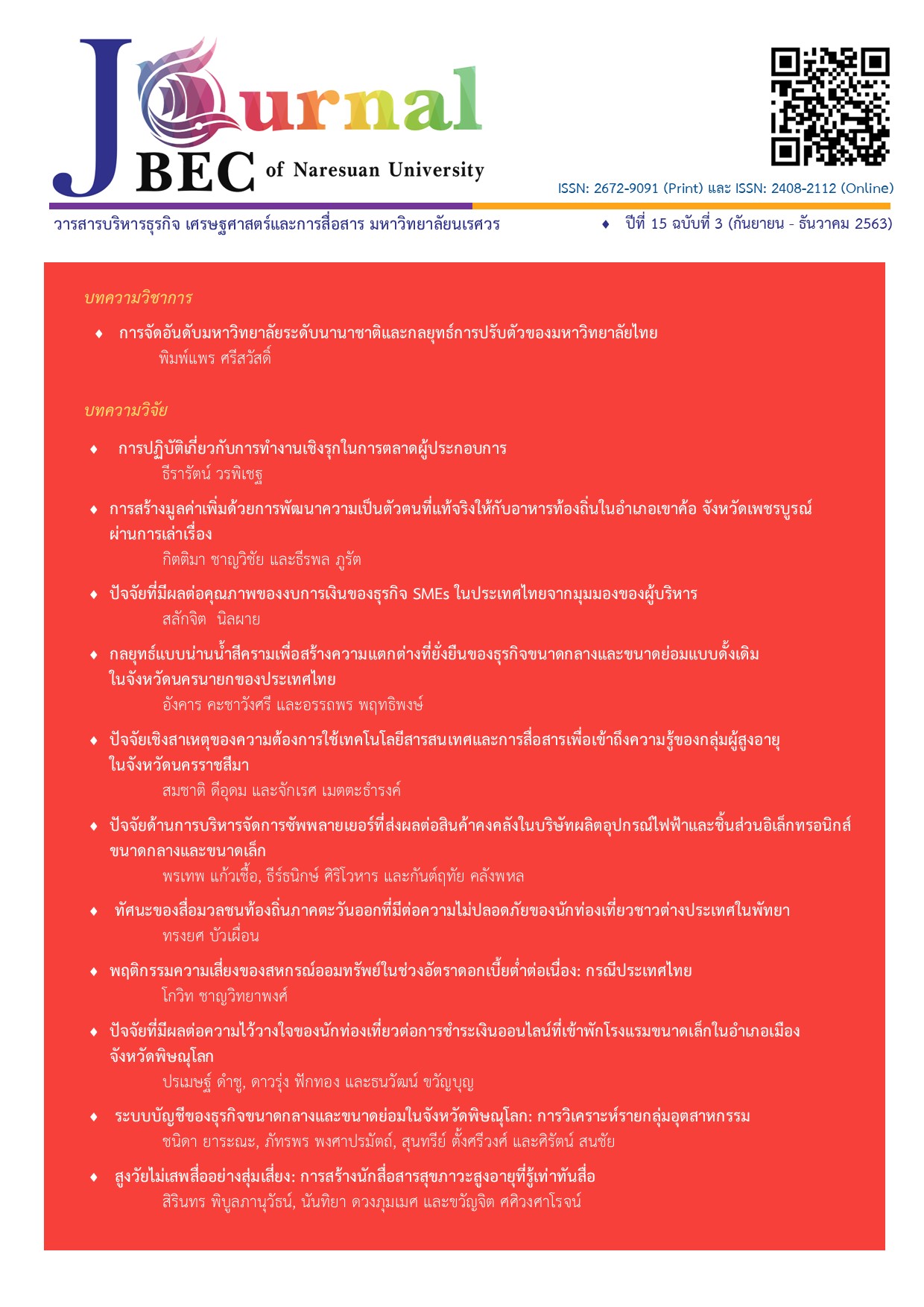Elderly Use of Risk-Free Media: Creating Media Literate Elderly Health Communicators
Main Article Content
Abstract
This research aims to 1) develop media and digital literacy skills among elderly people, 2) empower elderly people’s sense of self-worth through becoming well-being communicators who can create the right media for their community and change society for the better, 3) gain knowledge about how to develop active aging citizens to becoming elderly media-literate well-being communicators in Thai society. This research applied a Participatory Action Research (PAR) approach with 268 elderly students in 5 elderly schools around Thailand; north, northeast, central, south, and Bangkok. The result shows that elderly participants gained a higher level of media literacy. The use of media literacy spell “Stop-Think-Ask-Act” helped reduce the participants’ risk of media exposure. Taking the role of a well-being communicator made them realize their own value and potential in creating well-being for themselves and their communities. Knowledge gained from this research was the process of developing elderly media-literate well-being communicators; study learning capacity and limitations of elderly, design content and process, implement activity-based learning.
Article Details
References
Biggins, O. (2012). Media and Information Literacy. Suthiparithat Journal, 26(80), 147-161.
Buckingham, D. (2007). Media education: literacy, learning and contemporary culture. Cambridge: Polity Press. ISBN 978-0745628301.
Buckingham, D. (2008). Defining Digital Literacy-What Do Young People Need to Know About Digital Media? in C. Lankshear, & M. Knobel, M. (eds.). Digital Literacies: concepts, policies and practices. (pp. 73-88). New York: Peter Lang.
Center for Media Literacy. (2008). Literacy for the 21st Century: An Overview & OrientationGuide to Media Literacy Education. Retrieved December 22, 2018, from http://medialit.org/sites/default/files/01a_mlkorientation_rev2.pdf
College of Management. (2018a). AWUSO Society 4.0. In Awuso Insight Seminar. Retrieved February 11, 2020, from http://www.cmmu.mahidol.ac.th/cmmu/index.php/9-college-news /540awuso-society-4-0
College of Management. (2018b). Silver Age Content Marketing. In the Twenty-Seventh Marketing
Conference. Retrieved February 11, 2020, from https://www.cm.mahidol.ac.th/cmmu/index.php/9-college-news/614-marketing conference-silver-age-content-marketing
Department of Older Persons. (2017). The situation of Thai elderly people 2016. Retrieved December 22, 2018, from http://www.dop.go.th/th/know/side/1/2/146
Gray, R., Pattaravanich, U., Chamchan, C. and Suwannoppakao, R. (2013). New Concept of Older Persons: The Psycho–Social and Health Perspective, Institute for Population and Social Research, Mahidol University. Nakhon Pathom: Duan Tula Press.
Hern, A. (2019). Older people more likely to share fake news on Facebook, study finds. Retrieved August 14, 2019, from https://www.theguardian.com/technology/2019/ jan/10/older-people-more-likely-to-share-fake-news-on-facebook
Hobbs, R. (2006). Multiple visions of multimedia literacy: Emerging areas of synthesis. In M.
McKenna, L. Labbo, R. Kieffer and D. Reinking, (Eds.). Handbook of literacy and technology, Volume II. (pp. 15 -28) International Reading Association, Mahwah: Lawrence Erlbaum Associates.
Hobbs, R. and Moore, D. C. (2013). Discovering Media Literacy: Teaching Digital Media and Popular Culture in Elementary School. Thousand Oaks: Corwin Press.
Hooyman, N. R., Kawamoto, K. Y. and Kiyak, H. A. (2015). Aging matters: An introduction to social gerontology. Boston, MA: Pearson.
Keawthep, K., Kanpai, K., and Sathapitanon, P. (2000). Old media – new media: Symbol identity ideology. Bangkok: Parp pim.
Kleechaya, P. (2016). Digital Literacy of Thai Secondary School Students. Journal of Communication Arts Review, 20(1), 46-57.
Kleechaya, P. (2014). Mainstream Media Literacy of Bangkok Residents. Journal of Communication Arts, 32(2), 1-24.
Kleechaya, P. (2012). Information Need, Media Uses and Media Habit of Thai Elderly. Research Report in Faculty of Communication Arts, Chulalongkorn University, Bangkok.
Livingstone, S. (2004). What is media literacy? Intermedia, 32 (3). pp. 18-20.
Nam, K. A., (2015). High context and low context communication. In J.M. Bennett (Ed.), The SAGE Encyclopedia of Intercultural Competence. Thousand Oak, CA: Sage Publication.
Office of the National Digital Economy and Society Commission. (2018). ONDE find ways to promote and develop media literacy for the public understanding of the media uses with awareness. Retrieved June 13, 2020, from https://www.onde.go.th/view/1/รายละเอียดข่าว/ข่าวสดช./403/TH-TH
Post today. (5 March 2018). Found Thai elderly being tricked into buying poor quality products. Retrieved August 14, 2020, from ้https://www.posttoday.com/social/general/543153
Potter, W. J. (2010). The State of Media Literacy. Journal of Broadcasting & Electronic Media, 54(4), 675–696. doi:10.1080/08838151.2011.521462. ISSN 0883-8151.
Sathapitanon, P., Kamnoonwatana, D., Kadnak, H., Srisamai, S., Buaprakhon, D., Yaichid, J., et al. (2006). Participatory communication and community development: from a concept into practice in Thailand. Bangkok: The Thailand Research Fund.
Silverblatt, A. (1995). Media Literacy Keys to Interpreting Media Messages. USA: Praeger Publishers.
Somabut, A. (2013). Information, Media and Technology Skills in 21st century. Retrieved June 22,2019, from https://teacherweekly.wordpress.com/2013/09/25/information-media-and- technology-skills/
Sritanant, N. (2011). New media regulation in the convergence era. Executive Journal, 31(4), 126 -134. Retrieved June 13, 2020, from https://www.bu.ac.th/knowledgecenter/executive_journal/oct_dec_11/pdf/aw021.pdf
UNESCO (2013). Media and Information Literacy: Policy and Strategy Guideline. The United Nations Educational, Scientific and Cultural Organization.
Wilcox, D. (1999). A to Z of Participation. Joseph Rowntree Foundation.


